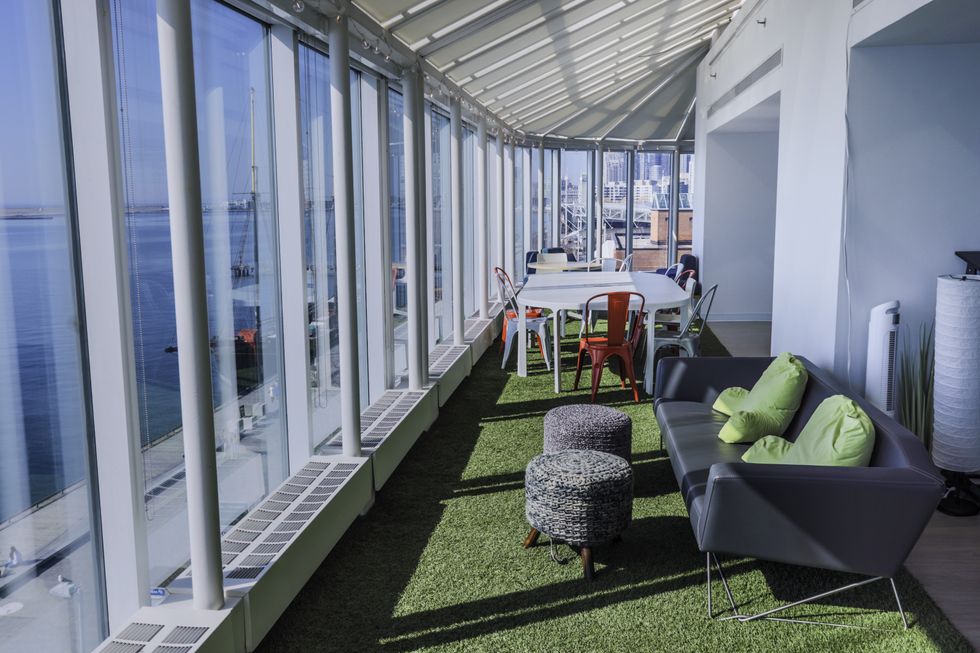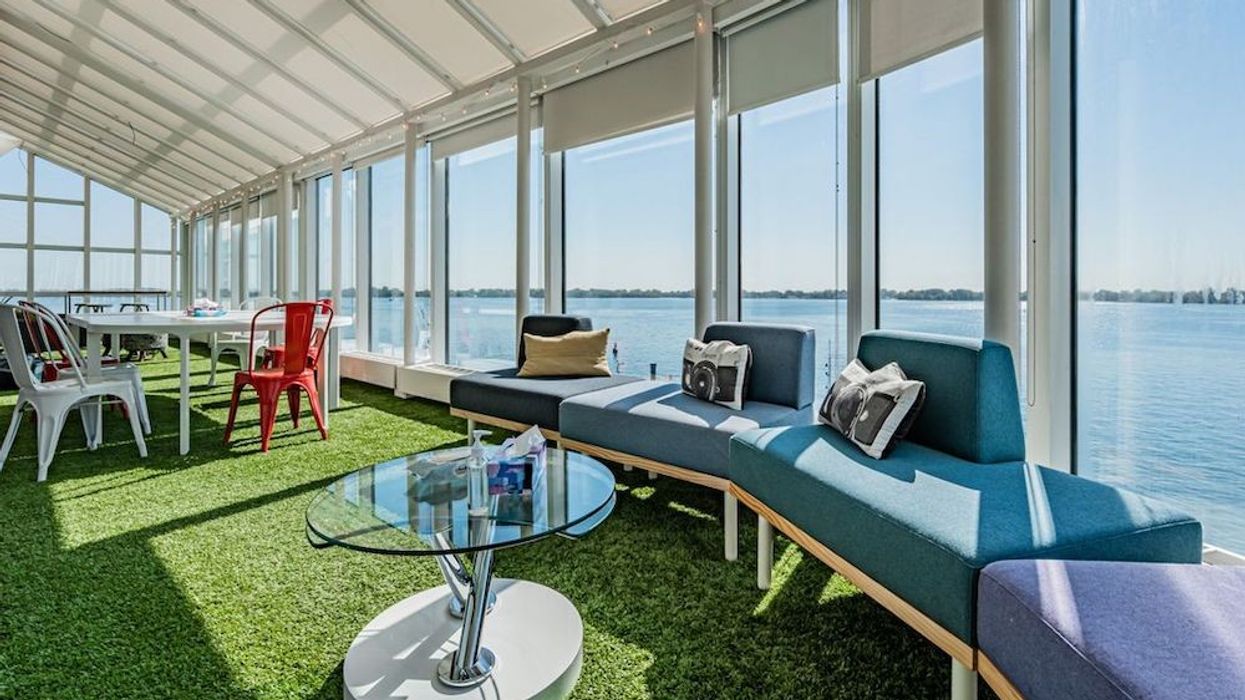In a post-pandemic world, the meaning of office space has changed — and in no small way.
From hybrid work schedules and flex office hours through to the sharing (and shedding) of office environments, there have been as many approaches taken to the in-office experience as there are companies, corporations, and start-ups.
The post-COVID office isn't a "solved" problem; most businesses are still finessing their updated schedules, trying to strike a balance between productivity and flexibility. But, as the dust begins to settle, and companies begin to find their footing, some businesses have proven to be stepping — further than others — off the "new normal" path.
One example is Humi. The payroll, HR, and benefits company, with an office located (right) on Toronto's waterfront, has taken a multi-pronged approach to optimizing its own sight-rich and spacious office space.
Having secured a lakeside office in the months prior to COVID, in the latter part of 2019, Humi's team was looking forward to scaling the business. This did happen, but — as 2020 would have it — the growth didn't play out exactly as expected.
"We scaled our company, but we obviously were scaling it in a more 'remote-friendly' way," says Chris Wainwright, COO of Humi. "We ended up hiring a lot of people, all across the country."
With employees located coast-to-coast, as COVID restrictions softened, it didn't make sense to serve staff with a Monday-Wednesday-Friday in-office mandate. And according to Wainwright, that's not something leadership would have been looking to implement, anyway.
"Kevin [Kliman, Humi CEO] really, really values in person interaction," Wainwright says. "But that doesn't mean he's the kind of guy who would force everybody back to the office — he understands the tradeoffs."
Instead, Humi's question became that of how to optimize its space while upholding Kliman's face-time value. While some businesses may have opted for a smaller office or co-working space exclusively for local employees, the benefits of a secure and spacious office actually proved too plentiful for Humi to trade away.
Still, these benefits didn't give themselves up easily; instead, they unveiled themselves through creative thinking and innovative, intentional choices.
Internal Benefits
Instead of implementing those mandated in-office days — which could entail asking people to make work-life sacrifices, such as extra-provincial moves or lengthy commutes — Humi's leadership team considered what their employees actually needed from their work environment, and how the office space could best serve their people (and their peoples' productivity).
One example is team events. At Humi, employees come together several times a month to enjoy real-life face time, on small and large scales.
"We do different in-person team events, bringing different teams together across the company; maybe you're bringing together the entire sales and marketing team for a couple of days. Or maybe it's all the people working on payroll," Wainwright says. This time is used to work on projects that benefit from in-person collaboration.
Humi's leadership team is also looking forward to nurturing company-wide connection via the office space. "In a couple of months, we're going to do our first — since 2022 — 'Humi Day', which is our annual: 'bring everybody in'," says Wainwright. "We'll have all 150 people at the office." Humi Day brings staff the chance to nurture their professional relationships, totally offline.
Beyond team meetings and morale-boosting company events, Humi also takes a more granular approach, considering the person behind the position — and what will actually support them.
"Lots of our employees have kids — including Kevin," Wainwright says, "Kevin had this great idea, especially on Fridays and Mondays when there are school PD days, we [invite employees to bring their kid(s) to the office]. We've got a big projector screen up front; a couple months ago, we had three or four people with their kids, and we had Mario Kart going out there for the kids while their parents were working. People bring their dogs in. We try to encourage stuff like that as much as we can for the employee, basically saying: 'if it helps you, great'."

Working to build a flexible and nourishing office environment, especially in a business with so many remote employees, isn't without its challenges. In Humi's case, Wainwright describes the struggle to bridge the gap between those who can frequent the office, and those for whom the in-office experience is ultra-rare. But even with hurdles, he describes the pursuit of optimizing office use as a worthy one.
"Sometimes, you get so caught up in trying to do everything 'equally,' that you just don't do something that adds 'good,' because you can't add good for everybody," he says. "The truth is, there is real value to being in-person sometimes, and it seems crazy to not leverage that when you can."
Community (and Company) Building
Employee health and happiness are top priority for Humi, but they're not the only foundations for the company's approach to its office space. Humi has also become a landing pad for industry colleagues, welcoming connections to borrow a work space, host a meeting, or put on an event.
"Kevin [Kliman] is incredibly well-connected and passionate about the tech community," Wainwright says. "Sometimes there are companies that are traveling in Toronto, or maybe three or four people from a company that need a place to work for a couple of days. Maybe somebody's going through a transition. We've had teams of 10 or 20 people in the office for a week, doing their thing."
"We also just run events here now," he adds. "We do panels; we've done hackathons for high school kids on weekends... we'll do a bunch of stuff around Collision [Conference]."
In the case of the hack-a-thon, Wainwright says the office was inquired about by the event's organizers, and his team was happy to oblige. And in general, offering use of the space is becoming more common for Humi, when a tech initiative, start-up, or small business reaches out for support.
"We're developing partnerships with incubators all across the country. We [recently] did our partnership with the DMZ . . . the dream with the incubator thing is, eventually, Humi becomes its own incubator ecosystem, and we're able to [help] facilitate these smaller companies and their journey. And, use that position as a way to develop talent, build community, and build business," says Wainwright. "The goal is using the office as a hub for that."
Indeed, a knock-on benefit of the space-sharing Humi has embraced for the office is: nurturing these relationships serves the long-term goals of the company itself. ("Win-win," meet "final form.")
"In this space, we love that we meet interesting people [who] are working on interesting things. Long-term, we're just trying to build something that is really an integral part of daily business," Wainwright says. "Having the office right now, we can continue to do stuff like that."

So, What About You(r Business)?
For business owners and company leaders reading, Humi's approach to office space could be inspiring — or, perhaps, intimidating.
To advise those who might like to expand the use-case for their own office, Wainwright can speak from both experience and a core value system.
"From the employee standpoint, [when thinking about encouraging people to come to the office], it's not about just putting snacks out. Obviously, these are things you can do, but [ideally, you're] truly making it so the only thing you're trying to get out of the office is having people there. They shouldn't have to act differently than they would at home, they shouldn't have to dress differently than they would at home, if the value of it is simply having people together."
Wainwright prefers to invite local employees to attend for a specific event — "come on in on Tuesday, we're going to do this thing," — rather than mandating a day of the week for attendance. (In fact, he takes a hard stance against mandated days. "Never do that, is my advice.")
Another supportive factor to consider, according to Wainwright, is commute time.
"I think the time spent together has nonlinear value to the time you're at home," he says. So, he invites employees to begin their commutes into work at 9am (or whenever they would typically log on for remote work). They're also invited to leave the office before 5pm, gauging their exit time by how long their commute home will be.
"To be honest, when I suggested that practice, what I noticed is people didn't really even fully use it. Most of the time, what it means is they will come a little later, but they mostly end up staying to the end of the day... Like, 'keep your routine, keep your timing'. I don't want to throw that off."

And, for those who are inspired by the concept of space-lending and hack-a-thon hosting? As it turns out, this may not be the exact formula for your space to serve your broader industry community — but there are lots of unique ways it probably could. The how will depend on who your company is, and what its goals and value systems — short- and long-term — actually look like.
"[In terms of space, ask,] what are you trying to do with it? It really depends on the kind of company you are and how much space you have," Wainwright says. "If you have a client facing business, you could use it for client events, right? If you have a consumer facing business, use it for interesting social things."
Ultimately, when there's an office space to make use of, businesses can experiment — inside and outside the box — to find their best flow.
"Companies who have people coming into the office should really rethink this whole, 'we're gonna make you come in three days a week, and really think about the trade-offs," Wainwright says. "Really think about being as intentional as you can with bringing people together."
Humi is the leading employment platform for Canadian businesses. We know running a business is more than just paperwork and tasks – we make it easy to care for businesses and those who bring them to life. We’re the best choice for supporting Canadian businesses in being better employers with a unified payroll, HR, and benefits solution. To learn more about Humi, visit humi.ca.
______________________________________________________________________________________________________________________________
This article was produced in partnership with STOREYS Custom Studio.





















